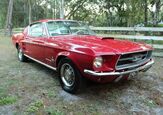Ford Projected To Lose $15 Billion Over Three Years Building EVs

2025 is merely weeks old, and already Ford is projecting its electric car business will lose another $5.5 billion dollars this year.
That figure matches last year’s deficit and eclipses the $4.7 billion the company lost building EVs in 2023—so for those of you keeping track at home that's a projection of roughly $15 billion in losses. Ford expects overall profitability this year, but it has lowered its earnings outlook compared to 2024.
CEO Jim Farley is working to stabilize Ford’s operations after a turbulent 2024, but the automaker now faces additional uncertainty from trade policy. Tariffs threatened by former President Donald Trump on goods from Mexico and Canada could raise raw material costs and impact sales.
Farley says Ford can handle short-term tariffs but warned that prolonged duties “would have a huge impact on our industry, with billions of dollars of industry profits wiped out, and [an] adverse effect on U.S. jobs.” However, he suggested Trump’s intent is to strengthen, not weaken, the domestic auto industry.
Farley has scaled back Ford’s EV strategy, cutting a three-row electric SUV and delaying the next-generation F-150 Lightning. Instead, the company is shifting focus to a mid-size electric pickup, expected in 2027, developed by its California-based "skunkworks" team.
Ford is leaning on hybrids. Last year, it sold nearly twice as many hybrids as EVs, moving 187,426 hybrid models compared to 97,865 electric vehicles. The company just announced it would focus on extended-range electric vehicles in the coming future, with plans for EREV versions of pickup trucks and SUVs like the F-150 and Expedition.
For 2025, Ford expects earnings before interest and taxes to land between $7.0 billion and $8.5 billion, down from the $10.2 billion recorded in 2024. The automaker has not factored tariffs into its 2025 outlook, as the policy remains unclear.
Trump's executive order imposing 25% tariffs on goods from Mexico and Canada has been delayed for a month following negotiations with both countries. If implemented, the tariffs would impact several of Ford’s most affordable models, including the Maverick, Bronco Sport, and Mustang Mach-E, all built in Mexico.
Become an AutoGuide insider. Get the latest from the automotive world first by subscribing to our newsletter here.

An experienced automotive storyteller and accomplished photographer known for engaging and insightful content. Michael also brings a wealth of technical knowledge—he was part of the Ford GT program at Multimatic, oversaw a fleet of Audi TCR race cars, ziptied Lamborghini Super Trofeo cars back together, been over the wall during the Rolex 24, and worked in the intense world of IndyCar.
More by Michael Accardi


































Comments
Join the conversation
What is the environmental case for EREVs? The main problem for *all* EVs is they are fueled 99% by fossil fuels. EREVs just move the fossil fuel into the vehicle.
All auto companies need to meet with all government groups in contolling laws for electric vehicles to let the market decide sales for the future!!! Common sense needs to prevail.